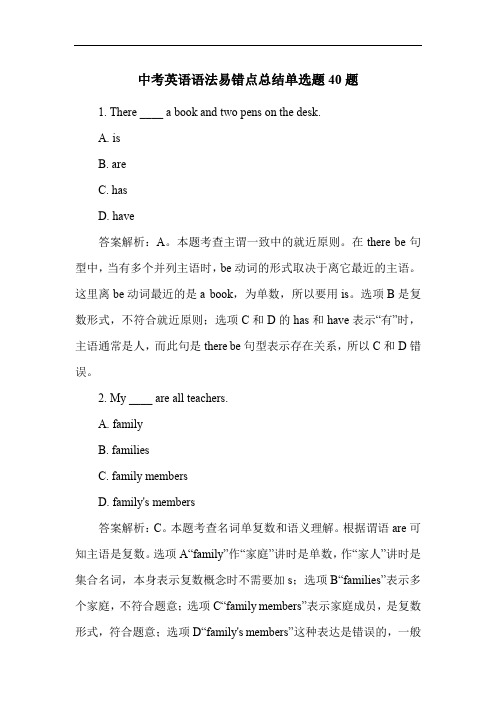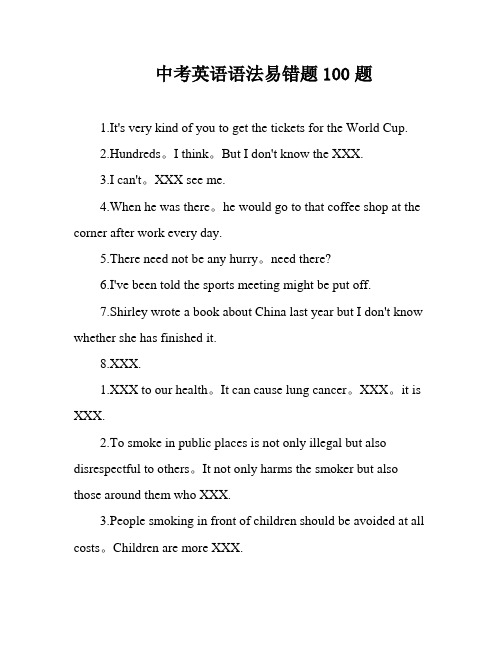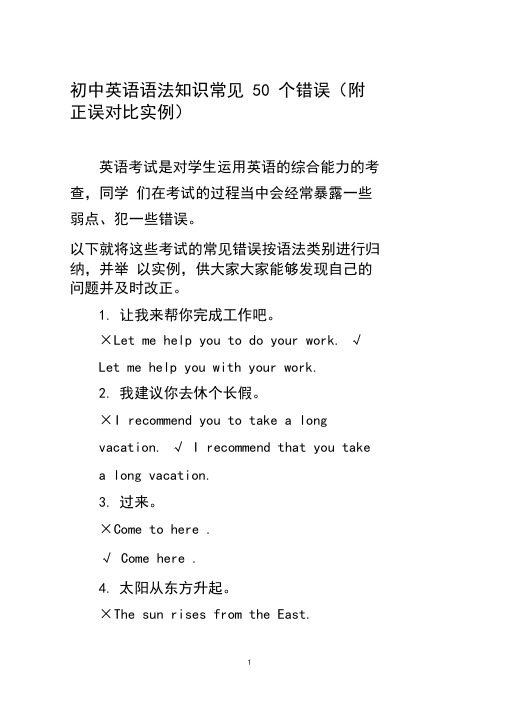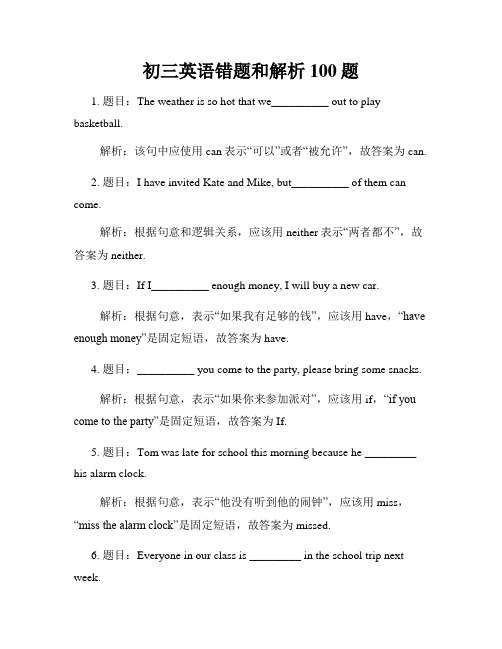中考英语语法易错点100例
英语语法易错点

英语语法易错点语法可以说是不少同学的心头痛,今天小编就为大家整理了英语语法易错点,内容较长,小编在这里整理了相关资料,希望能帮助到您。
引导定语从句的关系代词有 that,which,who(宾格 whom),所有格 whose) 和关系副词 where when why 等,关系代词或关系副词在定语从句中充当一个成分,关系代词 that,which,who,whom 等在从句中分别作主语或宾语,whose 在从句中作定语,而关系副词 when,where,why 等在从句中作状语。
如:①I will never forget the days when/in which we worked together.②I will never forget the days which/that we spent together.解析:在句①中,表示时间的名词 the days 在从句中充当的是状语,所以用关系副词 when 来代指,引导定语从句修饰先行词 the days;而在句②中,表示时间的名词 the days 在从句中充当的是动词 spent 的宾语,所以用关系代词 that 或 which 来代指。
同样,表示地点或原因的名词如果在从句中作状语,则用关系副词where 或 why 来代指;如果在从句中作动词的宾语,则用which 或 that 来代替。
如:①This is the factory where/in which I worked. (作状语)②This is the factory that/which I visited years ago. (作宾语)注:当先行词为 time,reason, place 时,引导词可以省略。
如:①This was the first (when/what) I had serious trouble with my boss.②That is the reason (why) I did it.③This is the place (where) we met yesterday.另外,定语从句中谓语动词的数应与先行词的数相一致。
初三英语语法易错点完形填空题30题

初三英语语法易错点完形填空题30题1My school life is very busy but interesting. I always get up early and go to school. After school, I often do my homework and then read books. Sometimes I play sports with my friends. On weekends, I usually go to the library or visit museums.1. I often ___ my homework after school.A. doB. doesC. doingD. did答案:A。
“often”表明是一般现在时,主语是“I”,谓语动词用原形do。
B 选项是第三人称单数形式;C 选项是现在分词;D 选项是过去式,均不符合。
2. Sometimes I play sports with my friends. I ___ playing basketball best.A. likeB. likesC. likedD. am liking答案:A。
“Sometimes”表明是一般现在时,主语是“I”,谓语动词用原形like。
B 选项是第三人称单数形式;C 选项是过去式;D 选项是现在进行时,均不符合。
3. On weekends, I usually ___ to the library.A. goB. goesC. goingD. went答案:A。
“usually”表明是一般现在时,主语是“I”,谓语动词用原形go。
B 选项是第三人称单数形式;C 选项是现在分词;D 选项是过去式,均不符合。
4. I ___ reading books in my free time.A. enjoyB. enjoysC. enjoyedD. am enjoying答案:A。
九年级英语易错题归纳

九年级英语易错题归纳对于九年级的学生来说,英语学科的难点和易错点主要集中在语法、词汇和阅读理解等方面。
以下是一些常见的易错题及其原因分析,希望能帮助同学们更好地掌握英语学习的方法和技巧。
一、语法易错题1. 时态和语态:在描述过去、现在或未来的事件时,容易混淆时态,如“Yesterday, I have finished my homework.”(正确的时态应该是“Yesterday, I finished my homework.”)。
同时,对于一般现在时、现在进行时、现在完成时等不同时态的区别和用法也容易混淆。
2. 名词和冠词:名词的单复数形式、可数与不可数名词的区分,以及冠词的用法(如“a/an”与“the”的区别)是常见易错点。
例如,“There is a apple on the table.”(正确的说法应该是“There is an apple on the table.”)。
3. 动词和介词:动词的过去式、过去分词以及动词不定式等形式的用法,以及介词后面接名词、代词或动名词的形式,容易出错。
例如,“He is come here.”(正确的说法应该是“He has come here.”)。
二、词汇易错题1. 同义词和反义词:对于一些意思相近或相反的词汇,容易混淆。
例如,“buy”和“purchase”,“increase”和“decrease”等。
2. 一词多义:某些单词在不同语境下有不同的意思,容易造成误解。
例如,“bank”既可以表示“银行”,也可以表示“河岸”。
三、阅读理解易错题1. 细节理解题:对于文章中的某个具体细节或事实,容易理解错误或忽略。
2. 推理判断题:对于作者的观点、态度或意图进行推断时,容易过度解读或误解。
中考英语语法易错点总结单选题40题

中考英语语法易错点总结单选题40题1. There ____ a book and two pens on the desk.A. isB. areC. hasD. have答案解析:A。
本题考查主谓一致中的就近原则。
在there be句型中,当有多个并列主语时,be动词的形式取决于离它最近的主语。
这里离be动词最近的是a book,为单数,所以要用is。
选项B是复数形式,不符合就近原则;选项C和D的has和have表示“有”时,主语通常是人,而此句是there be句型表示存在关系,所以C和D错误。
2. My ____ are all teachers.A. familyB. familiesC. family membersD. family's members答案解析:C。
本题考查名词单复数和语义理解。
根据谓语are可知主语是复数。
选项A“family”作“家庭”讲时是单数,作“家人”讲时是集合名词,本身表示复数概念时不需要加s;选项B“families”表示多个家庭,不符合题意;选项C“family members”表示家庭成员,是复数形式,符合题意;选项D“family's members”这种表达是错误的,一般说“members of the family”。
3. The ____ of the two boys are very good at English.A. bothB. allC. neitherD. two答案解析:A。
本题考查名词的限定词。
根据“two boys”可知是两者。
选项A“both”表示两者都,可作主语,谓语用复数形式,符合题意;选项B“all”表示三者或三者以上都,不符合题意;选项C“neither”表示两者都不,谓语要用单数形式,不符合句子中的谓语are;选项D“two”只是表示数量,不能作主语表示“两者都”的概念。
4. This is ____ room. The twin sisters like it very much.A. Lucy and Lily'sB. Lucy's and LilyC. Lucy's and Lily'sD. Lucy and Lily答案解析:A。
中考英语语法易错题100题

中考英语语法易错题100题1.It's very kind of you to get the tickets for the World Cup.2.Hundreds。
I think。
But I don't know the XXX.3.I can't。
XXX see me.4.When he was there。
he would go to that coffee shop at the corner after work every day.5.There need not be any hurry。
need there?6.I've been told the sports meeting might be put off.7.Shirley wrote a book about China last year but I don't know whether she has finished it.8.XXX.1.XXX to our health。
It can cause lung cancer。
XXX。
it is XXX.2.To smoke in public places is not only illegal but also disrespectful to others。
It not only harms the smoker but also those around them who XXX.3.People smoking in front of children should be avoided at all costs。
Children are more XXX.4.It is XXX them to quit。
This can be done through public campaigns。
support groups。
初中英语语法知识常见50个错误(附正误对比实例)

初中英语语法知识常见50 个错误(附正误对比实例)英语考试是对学生运用英语的综合能力的考查,同学们在考试的过程当中会经常暴露一些弱点、犯一些错误。
以下就将这些考试的常见错误按语法类别进行归纳,并举以实例,供大家大家能够发现自己的问题并及时改正。
1.让我来帮你完成工作吧。
×Let me help you to do your work. √Let me help you with your work.2.我建议你去休个长假。
×I recommend you to take a longvacation. √ I recommend that you takea long vacation.3.过来。
×Come to here .√ Come here .4.太阳从东方升起。
×The sun rises from the East.√ The sun rises in the East.5.小偷是从窗户爬进来的×The thief got in from the window.√ The thief got in through the window.6.让我们从第10 页开始。
×Let's begin from page 10.√ Let's begin at(on) page 10.7.我耐心有限。
×There is a limit in my patience.√ There is a limit to my patience.8.请在白线内等待。
×Please wait inside the white line. √ Please wait behind the white line.9.你家房子买了火险吗?×Is your house insured for fire?√ Is your house insured against fire?10.我没地方住。
初三英语错题和解析100题

初三英语错题和解析100题1. 题目:The weather is so hot that we__________ out to play basketball.解析:该句中应使用can表示“可以”或者“被允许”,故答案为can.2. 题目:I have invited Kate and Mike, but__________ of them can come.解析:根据句意和逻辑关系,应该用neither表示“两者都不”,故答案为neither.3. 题目:If I__________ enough money, I will buy a new car.解析:根据句意,表示“如果我有足够的钱”,应该用have,“have enough money”是固定短语,故答案为have.4. 题目:__________ you come to the party, please bring some snacks.解析:根据句意,表示“如果你来参加派对”,应该用if,“if you come to the party”是固定短语,故答案为If.5. 题目:Tom was late for school this morning because he _________ his alarm clock.解析:根据句意,表示“他没有听到他的闹钟”,应该用miss,“miss the alarm clock”是固定短语,故答案为missed.6. 题目:Everyone in our class is _________ in the school trip next week.解析:根据句意,表示“对下周的学校旅行感到兴奋”,应该用excited,“excited about the school trip”是固定短语,故答案为excited.7. 题目:The film was _________ good that I watched it twice.解析:根据句意,表示“这部电影非常好”,应该用so,“so good”是固定短语,故答案为so.8. 题目:Jennifer has been _________ for ten years. She knows a lot about fashion.解析:根据句意,表示“Jennifer从事时尚工作已经十年了”,应该用in,“in fashion”是固定短语,故答案为in.9. 题目:I'm sorry I _________ my key at home. I can't get into the house.解析:根据句意,表示“我把我的钥匙忘在家里了”,应该用left,“left my key at home”是固定短语,故答案为left.10. 题目:The little girl _________ at the sight of the spider.解析:根据句意,表示“小女孩一看到蜘蛛就哭了”,应该用cried,“cried at the sight of the spider”是固定短语,故答案为cried.......(继续完成剩余的90道题目)通过以上100道题目的解析,我们可以学到很多英语知识和语法规则。
中考英语语法易错易混知识点

中考英语语法易错易混知识点一、可数名词与不可数名词1.可数名词表示能够用数目表示的名词,常常可以用单数或复数形式来表示,其前可以加"a"或"an"。
例句:I have a book.(单数)/ I have two books.(复数)2.不可数名词表示不能用数目清楚地表示的名词,只能用单数形式,前面不能加"a"或"an"。
例句:I have some milk.(不可数名词)二、形容词与副词1.形容词修饰名词,用来描述或限定名词。
形容词通常放在名词的前面。
例句:She is a beautiful girl.2.副词用来修饰动词、形容词或其他副词,通常放在被修饰词的后面。
例句:He runs fast.三、一般现在时与现在进行时1.一般现在时表示经常性或习惯性的动作,叙述真理或客观事实。
例句:The sun rises in the east.(真理)/ He often plays soccer on weekends.(习惯性动作)2.现在进行时表示现在正在进行的动作。
例句:I am watching TV now.(正在进行的动作)四、一般过去时与过去进行时1.一般过去时表示已经结束的过去的动作。
例句:I finished my homework yesterday.(过去的动作已经完成)2.过去进行时表示过去其中一时刻正在进行的动作。
例句:They were playing basketball at 7 o'clock yesterday evening.(过去其中一时刻正在进行的动作)五、定冠词与不定冠词1.定冠词"the"用来特指已经提到过或可唯一确定的名词。
例句:I saw the boy in the park.(特指已经提到的男孩)2.不定冠词"a"或"an"用来表示泛指或不特指的名词。
- 1、下载文档前请自行甄别文档内容的完整性,平台不提供额外的编辑、内容补充、找答案等附加服务。
- 2、"仅部分预览"的文档,不可在线预览部分如存在完整性等问题,可反馈申请退款(可完整预览的文档不适用该条件!)。
- 3、如文档侵犯您的权益,请联系客服反馈,我们会尽快为您处理(人工客服工作时间:9:00-18:30)。
中考英语语法易错点100例1. a / an错:I have a MP4.对:I have an MP4.我有一个MP4。
错:Ann has a honest face.对:Ann has an honest face.安有一张诚实的面孔。
错:English is an useful language.对:English is a useful language.英语是一门有用的语言。
(a用于以辅音因素为首的词前;an用于以元音因素为首的词前。
)2. advice错:She gave me a good advice.对:She gave me a good piece of advice / some good advice.她给了我一点/ 一些好建议。
3. afford错:I can’t afford the money for a new coat.对:I can’t afford (to buy) a new coat.我承担不起买一件新外套的钱。
/我买不起一件新外套。
(一般不用money作afford宾语。
)4. after错:After you will leave, we will write to you every day.对:After you leave, we will write to you every day.你走后我们会每天给你写信。
(在after, as soon as等引导的时间状语从句中,用一般现在时表示将来。
)5. afternoon错:in the afternoon of 3rd July对:on the afternoon of 3rd July在七月三日下午(指一个特定的上午、下午、晚上介词用on。
)6. all错:We all were delighted when we heard the news.对:We were all delighted when we heard the news.我们听到这个消息都很高兴。
(all通常放在第一个助动词之后或实意动词之前,如果实意动词是be,all紧跟其后。
)7. allow错:It is not allowed to smoke here.对:Smoking is not allowed here./ People are not allowed to smoke here.这里不允许吸烟。
(allow不用于“It is not allowed to do sth”结构。
)8. although错:Although I was frightened, but I couldn’t scream.对:Although I was frightened, I couldn’t scream.虽然我很害怕,但是当时我无法喊出来。
(although不与but连用,但可以与yet,still连用。
)9. and (最易犯的错误)错:The problem was that he didn’t have any money and clothes.对:The problem was that he didn’t have any money or clothes.问题是他既没有钱也没有衣服。
(肯定句中用and,否定句中用or。
)10. another错:My mother loved her old sewing machine, but on her birthday my father bought her another new one.对:My mother loved her old sewing machine, but on her birthday my father bought her a new one.我母亲喜欢她那台旧缝纫机,但我父亲在她生日那天又给她买了一台新的。
11. answer错:They still can’t find an answer for this problem.对:They still can’t find an answer to this problem.他们依然找不到这个问题的答案。
(“……的答案”,介词用to。
)12. ask错:She asked me what was the time.对:She asked me what the time was.她当时问我那是几点。
(what, who, when, where引导的宾语从句用陈述句语序。
)13.as well错:When he reached her house, he noticed that there were no lights on. Hecouldn’t see her car as well.对:When he reached her house, he noticed that there were no lights on. Hecouldn’t see her car either.他到她家时,发现屋内没有灯光,也看不到她的车。
(as well很少用于否定句。
)14.belong to错:The car is belong to my wife. / The car is belonging to my wife.对:The car belongs to my wife.这辆汽车是我妻子的。
15.big错:While on holiday she caught a big disease.对:While on holiday she caught a serious disease.她在假期中得了一场大病。
16.borrow错:Can I borrow your bathroom, please?对:Can I use your bathroom, please?我能借用一下你的卫生间吗?(borrow只用于可搬动的东西。
)17.borrow / lend错:Can I lend your pen a minute?对:Can I borrow your pen a minute?我能否借你的笔用一用?(borrow指“借入”;lend指“借出”,是相对主语而言的。
)18.both错:I am pleased that my both children have called me.对:I am pleased that both my children have called me.我两个孩子都给我打了电话,我感到很高兴。
(both用于the, my, their等限定词之前。
)19.breakfast错:We have the breakfast at seven every day.对:We have breakfast at seven every day.我们每天七点钟吃早饭。
(一日三餐前通常不用冠词。
)20.certain错:She was very certain that they would offer her the job.对:She was quite certain that they would offer her the job.她极其肯定他们会给她这份工作。
(多用quite / fairly / absolutely修饰certain,很少用very。
)21.chalk错:He wrote the sentence down on the blackboard with a red chalk.对:He wrote the sentence down on the blackboard with red chalk.他用红色粉笔把这个句子写在了黑板上。
(chalk是不可数名词,a piece of chalk一支粉笔)22.change错:A lot of changes have been taken place in the city.对:A lot of changes have taken place in the city.这个城市发生了很多变化。
(表示发生变化,change作主语时,要用主动语态,不能用被动语态。
)23.class错:The whole class has gone to see the film.对:The whole class have gone to see the film.全班都去看电影了。
(class是集合名词,作主语时,若强调全体成员,谓语动词用复数;若强调整体,谓语动词用单数。
)24.congratulation错:Congratulation on your success!对:Congratulations on your success!祝贺你成功!(祝贺用复数形式。
)25.enter错:A strange man entered into the room.对:A strange man entered the room.一个陌生人走进了房间。
(enter a room, a building等,不加into。
)26.everyday / every day错:I go to the library everyday.对:I go to the library every day.(everyday是形容词,everyday English日常用语)27.man错:We saw two man doctors just now.对:We saw two men doctors just now.我们刚才看见两位男医生。
(man / woman构成的合成名词,表复数时,两者都变成复数形式。
)28.mine错:I want you to meet an old friend of me.对:I want you to meet an old friend of mine.我想让你见见我的一个老朋友。
29.past错:We didn’t have enough food before.对:We didn’t have enough food in the past.过去我们没有足够的食物。
30.sun错:Sun rises from the east.对:The sun rises in the east.太阳从东方升起。
31. cheap错:The price of this coat is very cheap.对:The price of this coat is very low. / This coat is very cheap.这件外套非常便宜。
